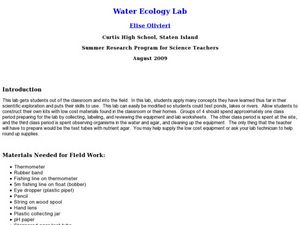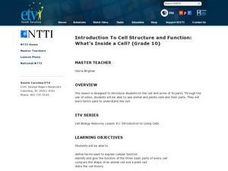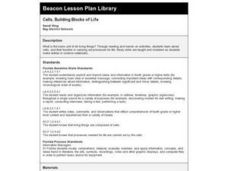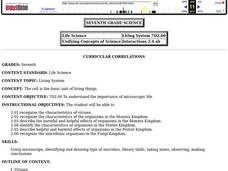Curated OER
What Color is the Ocean?
Students view satellite pictures of the ocean, and discuss the presence of phytoplankton and the colors of the ocean. Students compare/contrast ocean satellite images with maps and globes, then color world maps to replicate the satellite...
Curated OER
Show Me the Halite!
Introduce middle school mineralologists to halite. The opening of the lesson involves a video and worksheet to which there are no links. However, you can replace the video with any informational clip that you can find online about halite...
Curated OER
Case Study Two: Shark Dissection
Young scholars read an article on sharks prior to beginning a dissection lab. As part of the lab, students identify differences between the shark anatomy and human anatomy and hypothesize why those differences exist.
Curated OER
Food Safety Unit Exam 1
Students complete seventeen question test about food safety which includes matching vocabulary terms, short answer questions and fill in the blank questions. Test is part of the Food Safety Unit produced by the College of Agricultural...
Curated OER
Alfalfa Butterfly/Caterpillar Lifecycle Investigation
High schoolers collect and record data. They model specimens. Students identify sex of butterflies. They analyze data. High schoolers make conclusions based on collected data. They compare and contrast the different groups of insects...
Curated OER
The Energy of Light
Students discuss different ways engineers use light. In this engineering lesson, students are introduced to the properties of light and the way light is used. They view a demonstration of light waves using a slinky, and practice using...
Curated OER
Reading Comprehension-Grade 2
In this grade 2 reading comprehension worksheet, students read several short passages, answering 1-3 multiple choice comprehension questions after each. Answers are included.
Curated OER
Health Careers
Each of the 9 slides have a list of possible careers within areas of the Health industry. There are no explanations or details of any of the jobs and so this would be useful to introduce the areas and then let the students research some...
Curated OER
The Strength of the Muscular System
Seventh graders investigate the strength of the muscular system. They explore voluntary and involuntary muscle movement and discuss the types of muscles: cardiac or heart, skeletal, and smooth. They visit stations to answer questions...
Curated OER
Water Ecology Lab
Students determine the characteristics of a stream ecosystem and its organisms. In this water ecology lesson plan students complete several labs that shows them presence of life, water appearance, and water flow.
Curated OER
The Cell: Unit of Life
Students identify the parts of plant and animal cells, how samples can be obtained and what the differences are.
Curated OER
Have You Ever Seen a Sea Monkey?
Fourth graders observe brine shrimp over several days. They create drawings showing the growth and development of the shrimp. They research web sites to find out where brine shrimp fit on the food chain and what makes the shrimp unique.
Curated OER
Sediment Deposition Lab
Learners set up a stream table, observe erosion, and record data on where various sizes of sediments settle. They draw conclusions as to what kind of sedimentary rock form in what locations.
Curated OER
Cells And Their Parts
Learners investigate different types and their parts. They differentiate prokaryote and eukaryote cells and create a venn diagram displaying differences or similarities. Students write ten similes related to the cells and parts of them.
Curated OER
Diatom Ooze
Students explore seafloor sediment. In this ocean environment lesson, students describe the characteristics of different types of seafloor sediment and oozes. They compare and discuss locations of sediments and oozes by plotting the...
Curated OER
Introduction To Cell Structure and Function: What's Inside a Cell?
Tenth graders are introduced to the cell and some of its parts. Through the use of video, 10th graders see animal and plants cells and their parts. They learn terms used to explain the cell.
Curated OER
Cells, Building Blocks of Life
Fourth graders, in groups, explore cells, the basic unit of all living things.
Curated OER
Introductory Microbiology
Young scholars view a Reading Rainbow video on germs and discuss microbial diseases. They grow cultures of Staphylococcus aureus and then estimate and graph the count for their own bodies and those of the class.
Curated OER
Guess What?! (a lesson about atoms)
Students investigate atoms as particles that make up all matter. They examine the mass of matter.
Curated OER
Cytoplasmic Streaming
Students prepare successful wet mount slide of Elodea. They determine and identify environmental conditions that induce cytoplasmic streaming. They determine the positive aspects of cytoplasmic streaming. They illustrate knowledge and...
Curated OER
Cells
Seventh graders look up pictures of viruses or pictures of models of viruses. Using pipe cleaners, beads, Styrofoam or other available materials make models of these shapes. They then observe a demonstration to show the effect of Tobacco...
Curated OER
What's That Brown Fuzzy Stuff on My Plum?
Students use Koch's Postulates to determine that a specific organism is the root cause of a specific disease and identify what Koch's Postulates are within a protocol. They describe symptoms and signs of diseased fruit and isolate fungal...
Curated OER
Ecosystem Damage from Household Cleaners
Third graders assess the damage done to various ecosystems by cleaning products and discover how scientists test water quality. Using stream water and common household cleaning agents, they work in groups to test for pH levels. Once...
Curated OER
Investigation Xylem
Students investigate how water travels up the stem of vascular plants by using food coloring to stain the xylem of a number of different plants. They know the function of leaves, stems, and root at the end of the experiment.
Other popular searches
- Parts of a Microscope
- Compound Microscopes
- Label Compound Microscope
- Dissection Microscopes
- Microscope Cheek Cells
- Digital Microscope
- Microscope Lab
- Biology Lab Microscopes
- Scanning Electron Microscopes
- Cheek Cells and Microscopes
- Lesson Plan on Microscopes
- Lenses and Microscopes

























